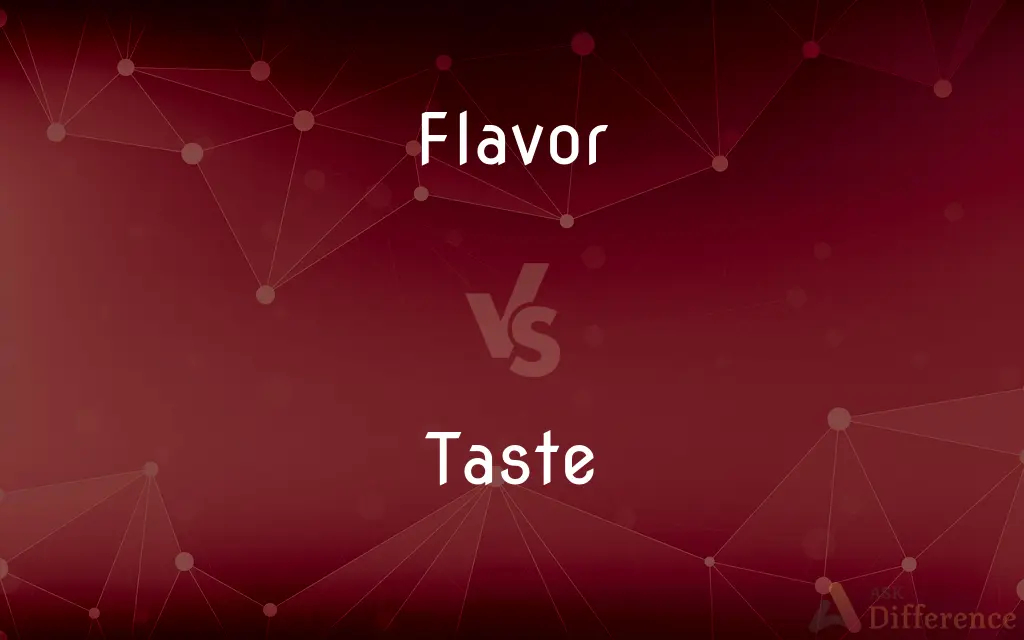Flavor vs. Taste — What's the Difference?
By Tayyaba Rehman — Updated on October 5, 2023
Flavor is the complex quality of something consumable. Taste is the sensation from consuming something, or a liking.

Difference Between Flavor and Taste
Table of Contents
ADVERTISEMENT
Key Differences
"Flavor" pertains to the specific quality of food or drink experienced through the sense of taste and smell, embodying the depth and range of palatable experiences. Conversely, "Taste" can articulate both the sensory experience from the tongue and a preference or discernment in choice.
"Flavor" emerges from a combination of senses, primarily taste and smell, amalgamating to create a comprehensive perception of what is being consumed. "Taste," however, restricts itself to the sensory input from the tastebuds or, alternately, to denote an inclination or preference.
"Flavor" essentially is a descriptive word, conveying the specific characteristics of consumable items through olfactory and gustatory senses. "Taste" navigates through broader channels, spanning physical sensory experiences and metaphorical uses to describe preference or aesthetic.
Cultural and regional differences tend to have a significant impact on "flavor," modifying and creating variations in culinary contexts. "Taste," however, waltzes through realms of personal, societal, or cultural preferences, embodying subjective likings or dislikings.
While "flavor" carries a specificity, binding itself predominantly to the culinary world, "taste" spans a more expansive scope, not only addressing the act of tasting but also serving as a metric for preference and discernment in various scenarios, extending beyond the culinary.
ADVERTISEMENT
Comparison Chart
Primary Association
Culinary sensory experience
Sensory experience or preference
Dependency
Relies on taste and smell
Not necessarily reliant on other senses
Breadth of Application
Primarily linked to food and drink
Wider, includes aesthetic preferences
Subjectivity
Somewhat objective (e.g., sweetness level)
Can be highly subjective
Metaphorical Usage
Rarely used metaphorically
Commonly used metaphorically
Compare with Definitions
Flavor
A distinctive taste of food or drink.
The sauce has a spicy flavor.
Taste
The sensation of flavor perceived in the mouth.
The taste of apple is sweet.
Flavor
To give a specific taste or impression.
He flavored the soup with fresh herbs.
Taste
A small portion to sample.
Give me a taste of the stew.
Flavor
A particular quality noticeable in a thing.
His speech has a flavor of patriotism.
Taste
The ability to discern aesthetic quality.
He has good taste in clothing.
Flavor
Characteristic or predominant quality.
The flavor of the experience was bittersweet.
Taste
The gustatory system or sense of taste is the sensory system that is partially responsible for the perception of taste (flavor). Taste is the perception produced or stimulated when a substance in the mouth reacts chemically with taste receptor cells located on taste buds in the oral cavity, mostly on the tongue.
Flavor
Flavor, or flavour, is the perceptual impression of food or other substances, and is determined primarily by the chemical senses of the gustatory and olfactory system. The "trigeminal senses", which detect chemical irritants in the mouth and throat, as well as temperature and texture, are also important to the overall gestalt of taste perception.
Taste
The sensation of flavour perceived in the mouth and throat on contact with a substance
The wine had a fruity taste
Flavor
Distinctive taste; savor
A flavor of smoke in bacon.
Taste
A person's liking for particular flavours
This pudding is too sweet for my taste
Flavor
A distinctive yet intangible quality felt to be characteristic of a given thing
"What matters in literature ... is surely the idiosyncratic, the individual, the flavor or color of a particular human suffering" (Harold Bloom).
Taste
The ability to discern what is of good quality or of a high aesthetic standard
She has frightful taste in literature
Flavor
A flavoring
Contains no artificial flavors.
Taste
Perceive or experience the flavour of
She had never tasted ice cream before
Flavor
Any of six types of quark (down, up, strange, charm, bottom, top), distinguished by generation, electric charge, and mass.
Taste
Have experience of
The team has not yet tasted victory at home
Flavor
Any of six types of lepton (electron, electron neutrino, muon, muon neutrino, tauon, tau neutrino), distinguished by generation, electric charge, and mass.
Taste
To distinguish the flavor of by taking into the mouth.
Flavor
(Archaic) Aroma; fragrance.
Taste
To eat or drink a small quantity of.
Flavor
To give flavor to.
Taste
To partake of, especially for the first time; experience
Prisoners finally tasting freedom.
Flavor
The quality produced by the sensation of taste or, especially, of taste and smell in combined effect.
The flavor of this apple pie is delicious.
Taste
(Archaic) To appreciate or enjoy.
Flavor
A substance used to produce a taste. Flavoring.
Flavor was added to the pudding.
Taste
To distinguish flavors in the mouth.
Flavor
A variety (of taste) attributed to an object.
What flavor of bubble gum do you enjoy?
Taste
To have a distinct flavor
The stew tastes salty.
Flavor
The characteristic quality of something.
The flavor of an experience
Taste
To eat or drink a small amount.
Flavor
(informal) A kind or type.
Debian is one flavor of the Linux operating system.
Taste
To have experience or enjoyment; partake
Tasted of the life of the very rich.
Flavor
(particle physics) One of the six types of quarks (top, bottom, strange, charmed, up, and down) or three types of leptons (electron, muon, and tauon).
Taste
The sense that distinguishes the sweet, sour, salty, and bitter qualities of dissolved substances in contact with the taste buds on the tongue.
Flavor
(archaic) The quality produced by the sensation of smell; odour; fragrance.
The flavor of a rose
Taste
This sense in combination with the senses of smell and touch, which together receive a sensation of a substance in the mouth.
Flavor
To add flavoring to something.
Taste
The sensation of sweet, sour, salty, or bitter qualities produced by a substance placed in the mouth.
Flavor
That quality of anything which affects the smell; odor; fragrances; as, the flavor of a rose.
Taste
The unified sensation produced by any of these qualities plus a distinct smell and texture; flavor.
Flavor
That quality of anything which affects the taste; that quality which gratifies the palate; relish; zest; savor; as, the flavor of food or drink.
Taste
A distinctive perception as if by the sense of taste
An experience that left a bad taste in my mouth.
Flavor
That which imparts to anything a peculiar odor or taste, gratifying to the sense of smell, or the nicer perceptions of the palate; a substance which flavors.
Taste
The act of tasting.
Flavor
That quality which gives character to any of the productions of literature or the fine arts.
Taste
A small quantity eaten or tasted.
Flavor
To give flavor to; to add something (as salt or a spice) to, to give character or zest.
Taste
A limited or first experience; a sample
"Thousands entered the war, got just a taste of it, and then stepped out" (Mark Twain).
Flavor
The general atmosphere of a place or situation and the effect that it has on people;
The feel of the city excited him
A clergyman improved the tone of the meeting
It had the smell of treason
Taste
A personal preference or liking
A taste for adventure.
A play that was not to my taste.
Flavor
The taste experience when a savoury condiment is taken into the mouth
Taste
The ability to recognize and appreciate what is beautiful, excellent, or appropriate
Has good taste in clothes.
Flavor
(physics) the kinds of quarks and antiquarks
Taste
The sense of what is proper, seemly, or least likely to give offense in a given social situation
A remark made in bad taste.
Flavor
Lend flavor to;
Season the chicken breast after roasting it
Taste
(Obsolete) The act of testing; trial.
Flavor
A sort or variety.
This shop sells many flavors of ice cream.
Taste
One of the sensations produced by the tongue in response to certain chemicals; the quality of giving this sensation.
He had a strange taste in his mouth.
Venison has a strong taste.
Taste
The sense that consists in the perception and interpretation of this sensation.
His taste was impaired by an illness.
Taste
A small sample of food, drink, or recreational drugs.
Taste
A person's implicit set of preferences, especially esthetic, though also culinary, sartorial, etc.
Dr. Parker has good taste in wine.
Taste
Personal preference; liking; predilection.
I have developed a taste for fine wine.
Taste
A small amount of experience with something that gives a sense of its quality as a whole.
Such anecdotes give one a taste of life on a trauma ward.
Taste
A kind of narrow and thin silk ribbon.
Taste
(transitive) To sample the flavor of something orally.
Taste
To have a taste; to excite a particular sensation by which flavor is distinguished.
The chicken tasted great, but the milk tasted like garlic.
Taste
(transitive) To identify (a flavor) by sampling something orally.
I can definitely taste the marzipan in this cake.
Taste
To experience.
I tasted in her arms the delights of paradise.
They had not yet tasted the sweetness of freedom.
Taste
To take sparingly.
Taste
To try by eating a little; to eat a small quantity of.
Taste
(obsolete) To try by the touch; to handle.
Taste
To try by the touch; to handle; as, to taste a bow.
Taste it well and stone thou shalt it find.
Taste
To try by the touch of the tongue; to perceive the relish or flavor of (anything) by taking a small quantity into a mouth. Also used figuratively.
When the ruler of the feast had tasted the water that was made wine.
When Commodus had once tasted human blood, he became incapable of pity or remorse.
Taste
To try by eating a little; to eat a small quantity of.
I tasted a little of this honey.
Taste
To become acquainted with by actual trial; to essay; to experience; to undergo.
He . . . should taste death for every man.
Taste
To partake of; to participate in; - usually with an implied sense of relish or pleasure.
Thou . . . wilt tasteNo pleasure, though in pleasure, solitary.
Taste
To try food with the mouth; to eat or drink a little only; to try the flavor of anything; as, to taste of each kind of wine.
Taste
To have a smack; to excite a particular sensation, by which the specific quality or flavor is distinguished; to have a particular quality or character; as, this water tastes brackish; the milk tastes of garlic.
Yea, every idle, nice, and wanton reasonShall to the king taste of this action.
Taste
To take sparingly.
For age but tastes of pleasures, youth devours.
Taste
To have perception, experience, or enjoyment; to partake; as, to taste of nature's bounty.
The valiant never taste of death but once.
Taste
The act of tasting; gustation.
Taste
A particular sensation excited by the application of a substance to the tongue; the quality or savor of any substance as perceived by means of the tongue; flavor; as, the taste of an orange or an apple; a bitter taste; an acid taste; a sweet taste.
Taste
The one of the five senses by which certain properties of bodies (called their taste, savor, flavor) are ascertained by contact with the organs of taste.
Taste
Intellectual relish; liking; fondness; - formerly with of, now with for; as, he had no taste for study.
I have no tasteOf popular applause.
Taste
The power of perceiving and relishing excellence in human performances; the faculty of discerning beauty, order, congruity, proportion, symmetry, or whatever constitutes excellence, particularly in the fine arts and belles-letters; critical judgment; discernment.
Taste
Manner, with respect to what is pleasing, refined, or in accordance with good usage; style; as, music composed in good taste; an epitaph in bad taste.
Taste
Essay; trial; experience; experiment.
Taste
A small portion given as a specimen; a little piece tasted or eaten; a bit.
Taste
A kind of narrow and thin silk ribbon.
What, then, is taste, but those internal powers,Active and strong, and feelingly aliveTo each fine impulse? a discerning senseOf decent and sublime, with quick disgustFrom things deformed, or disarranged, or grossIn species? This, nor gems, nor stores of gold,Nor purple state, nor culture, can bestow,But God alone, when first his active handImprints the secret bias of the soul.
Taste
The sensation that results when taste buds in the tongue and throat convey information about the chemical composition of a soluble stimulus;
The candy left him with a bad taste
The melon had a delicious taste
Taste
A strong liking;
My own preference is for good literature
The Irish have a penchant for blarney
Taste
Delicate discrimination (especially of aesthetic values);
Arrogance and lack of taste contributed to his rapid success
To ask at that particular time was the ultimate in bad taste
Taste
A brief experience of something;
He got a taste of life on the wild side
She enjoyed her brief taste of independence
Taste
A small amount eaten or drunk;
Take a taste--you'll like it
Taste
The faculty of taste;
His cold deprived him of his sense of taste
Taste
A kind of sensing; distinguishing substances by means of the taste buds;
A wine tasting
Taste
Have flavor; taste of something
Taste
Take a sample of;
Try these new crackers
Sample the regional dishes
Taste
Perceive by the sense of taste;
Can you taste the garlic?
Taste
Have a distinctive or characteristic taste;
This tastes of nutmeg
Taste
Distinguish flavors;
We tasted wines last night
Taste
Experience briefly;
The ex-slave tasted freedom shortly before she died
Taste
A personal liking or preference.
Her taste in music is eclectic.
Taste
To experience or try something.
She wanted to taste freedom.
Common Curiosities
Does "flavor" have metaphorical uses?
Rarely, it's mostly used in a literal, culinary context.
Can "taste" imply personal preference?
Yes, "taste" can imply personal, aesthetic, or culinary preference.
Can "taste" refer to experiencing something briefly?
Yes, e.g., "taste success" means to experience success briefly.
Can "taste" also mean trying out food?
Yes, "taste" can mean to try or experience the flavor of something.
Does "flavor" indicate more than taste?
Yes, "flavor" encompasses both taste and smell experiences.
Can "taste" indicate discernment?
Yes, "taste" can suggest aesthetic or qualitative discernment.
Are "flavor" and "taste" interchangeable?
Sometimes, but "flavor" is more specific to culinary contexts while "taste" has broader applications.
Is "flavor" subjective?
While it describes specific characteristics, the preference for a flavor is subjective.
Does "flavor" only relate to food?
Predominantly yes, though it may describe other consumables like drink.
Is "flavor" ever used to describe character?
Rarely, it's mostly utilized to describe sensory experiences.
Can "taste" reflect societal preferences?
Yes, "taste" can reflect personal, societal, or cultural preferences.
Does "flavor" pertain to a quality?
Yes, it details a specific culinary quality experienced when consuming.
Share Your Discovery

Previous Comparison
Samurai vs. Knight
Next Comparison
Inferno vs. HellAuthor Spotlight
Written by
Tayyaba RehmanTayyaba Rehman is a distinguished writer, currently serving as a primary contributor to askdifference.com. As a researcher in semantics and etymology, Tayyaba's passion for the complexity of languages and their distinctions has found a perfect home on the platform. Tayyaba delves into the intricacies of language, distinguishing between commonly confused words and phrases, thereby providing clarity for readers worldwide.














































